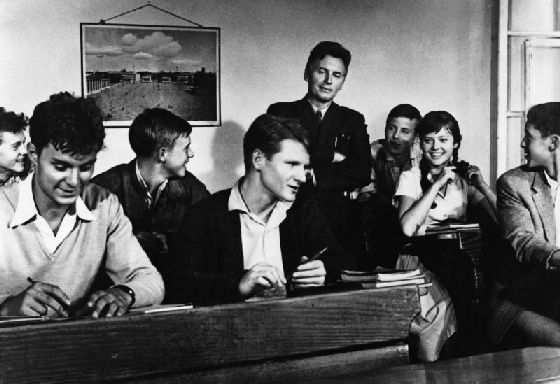The Bridge (1959) 
“They look for love in a world of violence!”

Director: Bernhard Wicki
Cast: Folker Bohnet, Fritz Wepper, Michael Hinz
Synopsis: In 1945, Germany is being overrun, and nobody is left to fight but teenagers.
For the first half of its running time, Bernhard Wicki’s German anti-war movie The Bridge (Die Brucke) plays like some mid-20th century soap opera in which a bunch of teenage boys wander about in unnaturally short shorts and nothing much of any significance happens. It’s all context of course, allowing us to get to know these youths so that the fate that awaits them becomes all the more senseless and horrific. Although some of them might have their share of problems, their inherent youthful optimism and enthusiasm for life shines through. Their ordinariness is also emphasised — although they’re Germans indoctrinated into Nazi ideology, these boys could just as easily be British or American. They’re keen to fight not because of an evil desire to see other countries conquered but to defend their own.
Of course, at sixteen years old these boys know nothing of life or the world or the horrors of war. Defeat is never considered, but the glory and pride of wearing a Nazi uniform and cleanly killing enemy soldiers is a constant preoccupation. They have no real understanding of the fact that, for Germany, the war is all but lost and that they are the last desperate option for a defeated country on the brink of capitulation. Only days after joining up, this woefully ill-equipped and poorly trained unit of recruits are called upon to fight at the front, but their kindly officer, aware that the boys will be of little use on the front line, obtains permission from his commander to send the boys to defend a strategically insignificant bridge which will be destroyed should the enemy breach their defences.
Much to their disappointment, the bridge the boys are sent to defend turns out to be the one in the home town they have just left. Believing themselves to have been abandoned by their officer, the boys nevertheless resolve to defend the bridge to the death, little realising the true horror and psychological trauma that awaits them.
If you needed any indication of the influence Bernhard Wicki’s The Bridge has had on subsequent war movies, you just have to look at the scene in Steven Spielberg’s Saving Private Ryan in which the deep rumbling of an approaching tank is heard from behind a building before coming into view and turning towards the film’s protagonists. The same scene can be seen in The Bridge. Basing the story on a true incident from the dying days of WWII, Wicki and the film’s writers fashion a stark message about the futility of war by crystallising the madness of this and other conflicts in this one, apparently insignificant, incident. The boys’ defence of the bridge is ultimately pointless, they lose their lives for no reason, and Wicki’s unsensational handling of the subject drives home his message all the more forcefully.
Because it’s a black-and-white foreign-language film that was made more than fifty years ago, The Bridge is not as widely seen as it deserves to be. It’s worth seeking out, however, as an example of an understated message movie that seeks no praise for delivering that message.
(Reviewed 27th March 2014)
httpv://www.youtube.com/watch?v=uecjvBaF_Oo
